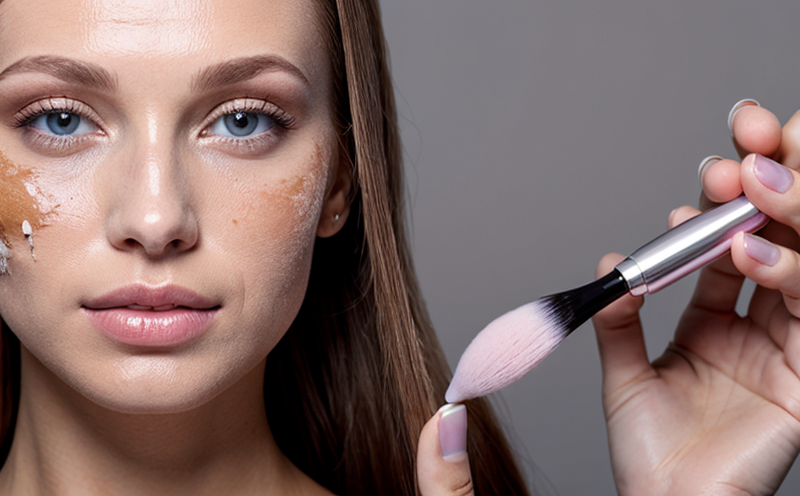Nanomaterial Compliance Testing under EU Regulation
The European Union's regulations on nanomaterials are a critical aspect of ensuring that cosmetics products comply with stringent safety and efficacy standards. The EU's Registration, Evaluation, Authorisation, and Restriction of Chemicals (REACH) regulation, along with specific nano-specific guidance, mandates thorough testing to assess the potential risks associated with nanomaterials in cosmetic formulations.
The primary objective of this compliance testing is to ensure that any nanomaterials used within a product do not pose health or environmental risks. This involves a series of tests aimed at characterizing the nanomaterials, assessing their behavior under various conditions, and determining whether they meet stringent regulatory criteria.
Testing for nanomaterial compliance typically includes several stages: identification, characterization, toxicity assessment, and bioavailability evaluation. Identification focuses on confirming the presence and type of nanomaterial used in the product. Characterization aims to understand its physical and chemical properties, such as size, shape, surface area, and reactivity.
The toxicity assessment evaluates whether the nanomaterials could cause adverse effects when used within the intended cosmetic formulation. This involves both in vitro and sometimes in vivo studies, depending on the complexity of the product and the nanomaterial involved. Bioavailability evaluation assesses how much of the nanomaterial can be absorbed by the body during use.
The testing process is highly technical and requires specialized equipment to ensure accuracy. Laboratories with expertise in this area use advanced analytical techniques such as transmission electron microscopy (TEM), dynamic light scattering (DLS), zeta potential analysis, and atomic force microscopy (AFM) for precise characterization of nanomaterials.
Compliance testing is not just about meeting legal requirements; it also plays a crucial role in maintaining consumer trust. By ensuring that products are safe and effective, companies can build a strong reputation in the market. This service helps businesses navigate the complexities of EU regulations, providing them with clear, actionable insights into their product's compliance status.
Understanding the specific requirements under REACH for nanomaterials is essential for manufacturers looking to ensure regulatory compliance. The European Chemicals Agency (ECHA) provides comprehensive guidance on how companies should approach testing and reporting for nanomaterials in cosmetics. This includes detailed documentation of test procedures, results, and any necessary risk mitigation strategies.
It's important to note that the EU’s approach to nanomaterial regulation is continuously evolving. As new information emerges about the behavior and risks of these materials, regulations may change. Therefore, ongoing vigilance and adaptation are crucial for maintaining compliance with current standards.
Why Choose This Test
- Ensures Compliance: Our testing ensures that your products meet the stringent requirements set by EU regulations on nanomaterials in cosmetics.
- Reduces Risk: By identifying potential risks early, we help minimize legal and reputational risks for your business.
- Innovative Approach: Utilizing cutting-edge technology and methodologies, our team provides accurate and reliable results.
Customer Impact and Satisfaction
- Better Product Safety: By ensuring that your products are safe for consumers, you enhance customer trust and satisfaction.
- Enhanced Reputation: Demonstrating compliance with EU regulations can significantly boost the reputation of your brand in the market.
- Competitive Advantage: In an increasingly regulated industry, being ahead of regulatory changes is a key differentiator.
Use Cases and Application Examples
In the cosmetic industry, nanomaterials are used in various products such as sunscreens, anti-aging creams, and even hair dyes. For instance, zinc oxide nanoparticles are often used in sunscreen to provide broad-spectrum UV protection. Our testing ensures that these materials are safe for use on skin without causing irritation or other adverse effects.
Another example is the use of nanoceria (cerium dioxide) particles in anti-aging serums. These particles can penetrate deeper into the skin, potentially offering more effective delivery of active ingredients like retinol or hyaluronic acid. Our testing ensures that these particles do not cause any unintended side effects when used as intended.
We also work with companies developing new formulations that incorporate nanomaterials for enhanced performance. For example, carbon nanotubes can be used in hair care products to strengthen and protect strands. Our comprehensive testing helps ensure that such innovative formulations are safe and effective before they reach the market.
Our expertise extends beyond just the initial formulation stage. We also provide ongoing support to help companies stay compliant with evolving regulations. This includes conducting periodic re-assessments of existing products as new information becomes available about nanomaterials and their potential risks or benefits.





